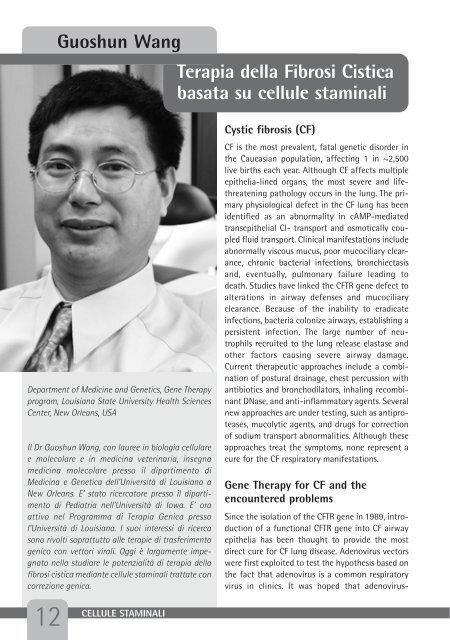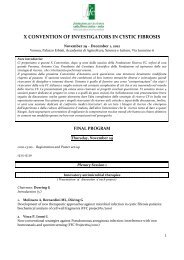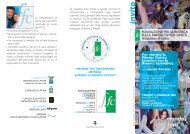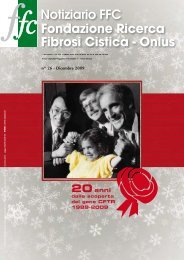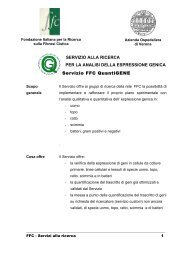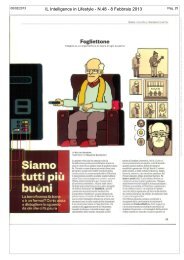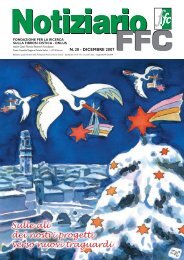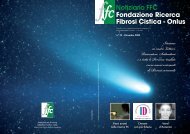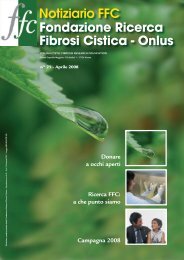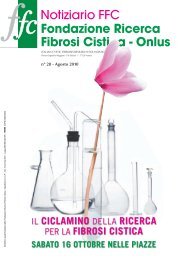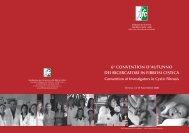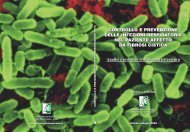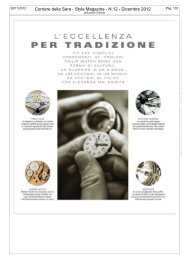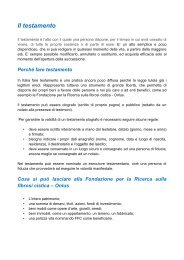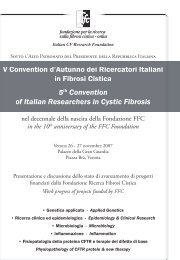Brochure Seminario di Primavera 2005 - Fondazione Ricerca ...
Brochure Seminario di Primavera 2005 - Fondazione Ricerca ...
Brochure Seminario di Primavera 2005 - Fondazione Ricerca ...
You also want an ePaper? Increase the reach of your titles
YUMPU automatically turns print PDFs into web optimized ePapers that Google loves.
Guoshun Wang<br />
Department of Me<strong>di</strong>cine and Genetics, Gene Therapy<br />
program, Louisiana State University Health Sciences<br />
Center, New Orleans, USA<br />
Il Dr Guoshun Wang, con lauree in biologia cellulare<br />
e molecolare e in me<strong>di</strong>cina veterinaria, insegna<br />
me<strong>di</strong>cina molecolare presso il <strong>di</strong>partimento <strong>di</strong><br />
Me<strong>di</strong>cina e Genetica dell’Università <strong>di</strong> Louisiana a<br />
New Orleans. E’ stato ricercatore presso il <strong>di</strong>partimento<br />
<strong>di</strong> Pe<strong>di</strong>atria nell’Università <strong>di</strong> Iowa. E’ ora<br />
attivo nel Programma <strong>di</strong> Terapia Genica presso<br />
l’Università <strong>di</strong> Louisiana. I suoi interessi <strong>di</strong> ricerca<br />
sono rivolti soprattutto alle terapie <strong>di</strong> trasferimento<br />
genico con vettori virali. Oggi è largamente impegnato<br />
nello stu<strong>di</strong>are le potenzialità <strong>di</strong> terapia della<br />
fibrosi cistica me<strong>di</strong>ante cellule staminali trattate con<br />
correzione genica.<br />
12<br />
CELLULE STAMINALI<br />
Terapia della Fibrosi Cistica<br />
basata su cellule staminali<br />
Cystic fibrosis (CF)<br />
CF is the most prevalent, fatal genetic <strong>di</strong>sorder in<br />
the Caucasian population, affecting 1 in ~2,500<br />
live births each year. Although CF affects multiple<br />
epithelia-lined organs, the most severe and lifethreatening<br />
pathology occurs in the lung. The primary<br />
physiological defect in the CF lung has been<br />
identified as an abnormality in cAMP-me<strong>di</strong>ated<br />
transepithelial Cl- transport and osmotically coupled<br />
fluid transport. Clinical manifestations include<br />
abnormally viscous mucus, poor mucociliary clearance,<br />
chronic bacterial infections, bronchiectasis<br />
and, eventually, pulmonary failure lea<strong>di</strong>ng to<br />
death. Stu<strong>di</strong>es have linked the CFTR gene defect to<br />
alterations in airway defenses and mucociliary<br />
clearance. Because of the inability to era<strong>di</strong>cate<br />
infections, bacteria colonize airways, establishing a<br />
persistent infection. The large number of neutrophils<br />
recruited to the lung release elastase and<br />
other factors causing severe airway damage.<br />
Current therapeutic approaches include a combination<br />
of postural drainage, chest percussion with<br />
antibiotics and broncho<strong>di</strong>lators, inhaling recombinant<br />
DNase, and anti-inflammatory agents. Several<br />
new approaches are under testing, such as antiproteases,<br />
mucolytic agents, and drugs for correction<br />
of so<strong>di</strong>um transport abnormalities. Although these<br />
approaches treat the symptoms, none represent a<br />
cure for the CF respiratory manifestations.<br />
Gene Therapy for CF and the<br />
encountered problems<br />
Since the isolation of the CFTR gene in 1989, introduction<br />
of a functional CFTR gene into CF airway<br />
epithelia has been thought to provide the most<br />
<strong>di</strong>rect cure for CF lung <strong>di</strong>sease. Adenovirus vectors<br />
were first exploited to test the hypothesis based on<br />
the fact that adenovirus is a common respiratory<br />
virus in clinics. It was hoped that adenovirus-


